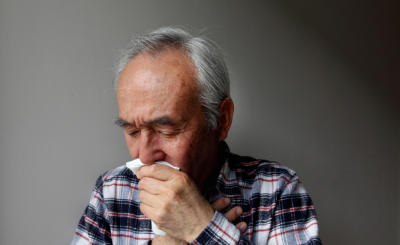7 Signs of Lung Cancer You Should Know
In the early stages of lung cancer, symptoms do not usually manifest – this is because the lungs do not have a significant amount of pain receptors. Many early lung cancers are diagnosed as an incidental finding with a test for a different purpose.
What to do when symptoms appear
When symptoms do appear, knowing the warning signs of lung cancer may allow you to get screened earlier. Finding lung cancer early allows for more personalized treatment options, with a much better success rate. Having one of the following symptoms of lung cancer is generally not a cause for worry, but if you experience multiple symptoms for an extended amount of time, it’s time to see your doctor.
Know these symptoms

Persistent Cough
Persistent Cough
Your body induces itself to cough in order to protect any particles from entering your airways and the lungs. A cough that doesn’t go away or worsens into a chronic cough, is one of the most common symptoms of lung cancer. If you are coughing up blood or rust-colored spit/phlegm, see your doctor immediately.

Shortness of Breath
Shortness of Breath
Shortness of breath could also be a sign of lung cancer. If a lung cancer tumor is blocking a major airway, it could cause shortness of breath. Sometimes fluid in the lungs can make breathing difficult and this could also be a sign of lung cancer. See your doctor if you have shortness of breath that concerns you.

Hoarseness
Hoarseness
Has your voice changed? Does it sound raspy? Are you hoarse? Has anyone pointed out that your voice sounds high-pitched? Vocal cords create sound by vibrating open and closed, but lung cancer can affect the nerve that triggers this movement. These changes in your voice could indicate lung cancer. But hoarseness or any changes in your voice are also commonly associated with many other conditions, such as laryngitis. You should make an appointment with your doctor to have any changes in your voice checked out.

Bronchitis, Pneumonia, or Emphysema
Bronchitis, Pneumonia, or Emphysema
Chronic bronchitis, pneumonia, or emphysema that doesn’t go away or that keeps coming back could be a sign of lung cancer, and according to studies, the conditions may be highly related. If you have symptoms of bronchitis or pneumonia, such as a cough, shortness of breath, slight fever and chills and chest discomfort, see your doctor for treatment as soon as possible.

Chest Pain
Chest Pain
If you have pain in your chest, it could indicate that there are blockages in your lungs, such as tumors, enlarged lymph nodes, or fluid buildup. Take note if the chest pain often is worse when you breathe deeply, cough or laugh. Pay attention to whether the pain is sharp, dull, constant or intermittent. See your doctor if you have chest pain that gets worse when breathing deeply, coughing or laughing.

Unexplained Weightloss
Unexplained Weightloss
Have you lost weight for no reason? One of the first signs of cancer, including lung cancer, is unexplained weight loss. This may be due to cancer cells diverting energy from food away from normal metabolic processes and toward their own unchecked cell growth. If you have lost 10 pounds or more and you haven’t been trying, see your doctor immediately.

Bone Pain
Bone Pain
Have you been experiencing mysterious aches and pains? It may be difficult to distinguish between bone and muscle pain, but take note if your pain increases: with movement, at night, or while lying on your back. Lung cancer less commonly causes pain in the shoulders, arms, and neck. Bone pain as a result of lung cancer may be caused by metastasis into the bones, especially the spine, pelvis, and upper bones of the arms and legs.
Any concerns regarding these lung cancer risk factors?
You should see your doctor to determine if you need further screening.

